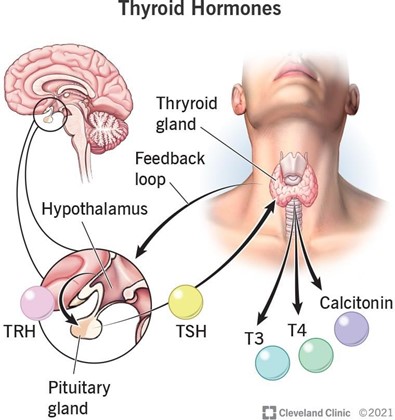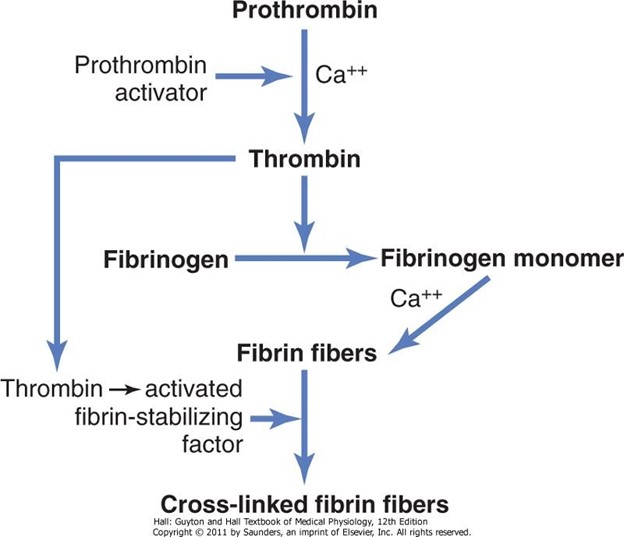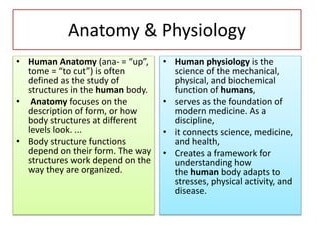The Thyroid gland secretes?
adrenaline.
insulin.
triiodothyronine.
parathyroid hormone.
The Correct Answer is C
The thyroid gland secretes triiodothyronine (T3), which is one of the two main thyroid hormones that affect almost every physiological process in the body.

T3 is the more metabolically active hormone produced from thyroxine (T4), which is the other thyroid hormone.
Choice A is wrong because the adrenal gland secretes hormones such as cortisol, adrenaline, and aldosterone, which are involved in stress response, blood pressure regulation, and metabolism.
Choice B is wrong because the pancreas secretes hormones such as insulin, glucagon, and somatostatin, which are involved in blood glucose regulation and digestion.
Choice D is wrong because the parathyroid gland secretes parathyroid hormone (PTH), which is involved in calcium and phosphate homeostasis.
Normal ranges for T3 levels vary depending on the laboratory and the method of testing, but they are usually between 100 and 200 nanograms per deciliter (ng/dL) for total T3 and between 2.3 and 4.2 picograms per milliliter (pg/mL) for free T.
Nursing Test Bank
Naxlex Comprehensive Predictor Exams
Related Questions
Correct Answer is B
Explanation

This is because fibrinogen is a soluble protein in the blood plasma that is converted to insoluble fibrin strands by the enzyme thrombin during blood clotting. Fibrin forms a mesh-like network that traps platelets and other blood cells to form a clot.
Choice A is wrong because thrombin is not converted to prothrombin, but rather prothrombin is converted to thrombin by another enzyme called prothrombinase.
Choice C is wrong because vitamin K is not converted to prothrombin, but rather vitamin K is required for the synthesis of prothrombin and other clotting factors in the liver.
Choice D is wrong because fibrin is not converted to fibrinogen, but rather fibrinogen is converted to fibrin as explained above.
Normal ranges of fibrinogen in the blood are 200 to 400 mg/dL.
Normal ranges of prothrombin time (a measure of how long it takes blood to clot) are 11 to
13.5 seconds.
Correct Answer is A
Explanation

This is because anatomy and physiology are closely related branches of biology that study the structure and function of living organisms respectively.
Anatomy describes the shape, size, location, and relationships of body parts, while physiology explains how those parts work together to maintain life.
For example, the anatomy of the heart determines how it pumps blood, and the anatomy of the lungs determines how they exchange gases.
Choice B is wrong because our understanding of both anatomy and physiology is constantly changing as new discoveries are made in the field of biology.
Choice C is wrong because body parts take up space regardless of their physiological functions.
Choice D is wrong because physiological functions are not limited to an organism, but can also occur at the cellular, tissue, organ, and system levels.
Whether you are a student looking to ace your exams or a practicing nurse seeking to enhance your expertise , our nursing education contents will empower you with the confidence and competence to make a difference in the lives of patients and become a respected leader in the healthcare field.
Visit Naxlex, invest in your future and unlock endless possibilities with our unparalleled nursing education contents today
Report Wrong Answer on the Current Question
Do you disagree with the answer? If yes, what is your expected answer? Explain.
Kindly be descriptive with the issue you are facing.
